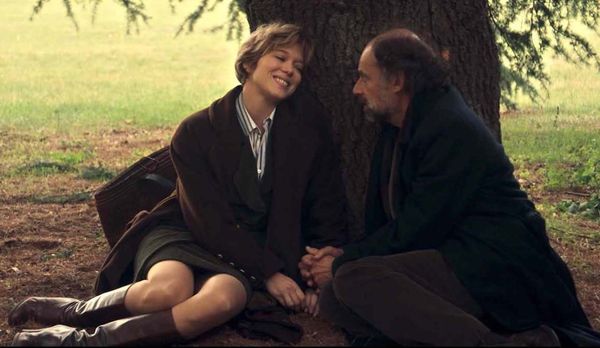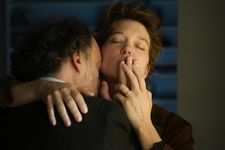Arnaud Desplechin’s Frère Et Sœur (Brother And Sister), starring Marion Cotillard, Golshifteh Farahani, Melvil Poupaud, and Cosmina Stratan has been selected to screen in the 75th anniversary edition of the Cannes Film Festival. Arnaud’s Ismael's Ghosts (Mathieu Amalric, Marion Cotillard, Charlotte Gainsbourg, Louis Garrel, Alba Rohrwacher) was the 2017 Cannes Opening Night Gala selection and his Philip Roth adaptation Deception (Denis Podalydès, Léa Seydoux, Emmanuelle Devos, Anouk Grinberg) was a 2021 highlight.
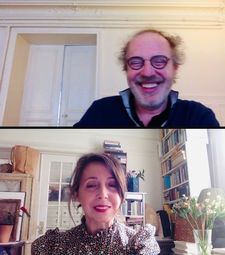 |
| Arnaud Desplechin with Anne-Katrin Titze on Philip Roth: “He’s as is, he’s absolutely imperfect, selfish as I was saying.” |
Desplechin will have had ten world premieres at Cannes: Oh Mercy! (Roschdy Zem, Sara Forestier, Seydoux); My Golden Days (Lou Roy-Lecollinet, Quentin Dolmaire, Léonard Matton, Amalric); Jimmy P: Psychotherapy Of A Plains Indian (Benicio Del Toro, Gina McKee, Misty Upham, Amalric); A Christmas Tale (Catherine Deneuve, Jean-Paul Roussillon); Esther Kahn (Summer Phoenix, Ian Holm); My Sex Life... or How I Got Into An Argument (Jeanne Balibar, Chiara Mastroianni, Emmanuel Salinger, Devos, Podalydès. Amalric), and The Sentinel (Thibault de Montalembert, Jean-Louis Richard, Salinger).
“When I met you, you were ripe” says Denis Podalydès’s Philip to his younger mistress In Deception. A line that sets off all the alarm bells, for, I suppose, many of us. But then Léa Seydoux responds. “No, I was rotting on the floor under a tree.” Her supreme delivery makes all the difference. It rescues the line, the lover, and catapults the film to another level of honesty. Thus is the power of great acting.
“I have no place here, none at all” is a sentence that is suitable for many of the women depicted in Philip Roth’s universe, not only those in Deception. It is honourable, this recognition by Desplechin, who follows the strand of the women’s utopia (in its original meaning as no-place) to another character as well. A former lover in New York, played by Emmanuelle Devos, is very ill.
When she states to Philip on the phone that “a call from my father makes the cancer worthwhile” it expresses less gallows humour than a true and sad emotional state. Devos gives again a bravura performance. Her character, based on Roth’s lover Janet Hobhouse, who wrote a memoir, The Furies, also has not found her place in this world.
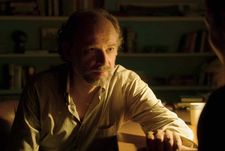 |
| Arnaud Desplechin on Denis Podalydès: “Denis is well-known in France for being a wonderful writer.” |
After chapter one, which takes place in autumn, the film moves on to Prague (shown in back projection for a Hitchcock feel) as a woman (Madalina Constantin) talks of being nothing but “a little Czech girl” who was treated as though she were a prostitute.
We also get to see Philip with his wife (Anouk Grinberg) who found his notebook with all the exchanges we have seen. “She doesn’t exist,” he insists about the lover and all the others too. “She is only words.”
In the third of my series of conversations with Arnaud Desplechin on Deception (Tromperie) we discuss the performances of Emmanuelle Devos and Denis Podalydès, Janet Hobhouse’s book The Furies, and Philip Roth not looking for redemption.
From Paris in February, Arnaud joined me on Zoom for an in-depth conversation on Deception before flying to Senegal with Marion Cotillard to film the epilogue for Frère Et Sœur.
Anne-Katrin Titze: Deception is an international story. They do talk about the specifics, that is Philip talks about “the British and the Jews.” Otherwise what is happening here is quite universal.
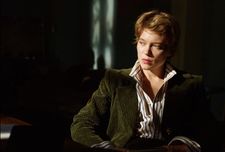 |
| Léa Seydoux plays Philip’s 20-plus years younger gentile British actress mistress |
Arnaud Desplechin: It’s quite universal. Actually in the book Philip Roth didn’t use the idiomatic English, not that much. He didn’t use the accents, the specific idiosyncrasies of British English etc. No, it’s about Jews and non-Jews. It’s a love story. As Philip Roth himself was saying, the best subject for the novels of the 19th century has been adultery. And he wanted to write a novel about adultery in the 20th century.
And now we are in the 21st century and adapting Roth and making my own choice about the scenes that I wanted to film and the scenes I wanted to avoid and subtly moving things from this place to that place in the cut, I managed to add some laughs where Philip Roth was perhaps more serious than that.
I am thinking about the scene about the trial, which to me is a nightmare, is Kafkaesque. But it’s a joke, because Philip is not that right. The prosecutor is quite right too. That’s why it starts to be funny. He’s not a saint. To film it after, during #MeToo, I thought it was more interesting than to do it before. Suddenly you could hear so many things; it was quite moving to do this film today.
Now when you have this explosion of anti-Semitism amongst the left side of England, the Labour Party, with the eviction of some big heads, etc. You realize that Philip Roth smelled it the decade before.
![Arnaud Desplechin on Emmanuelle Devos: “[She] is giving such a heartbreaking performance in the part of Rosalie Nichols.”](/images/newsite/Emmanuelle_Devos_in_Deception_225.jpg) |
| Arnaud Desplechin on Emmanuelle Devos: “[She] is giving such a heartbreaking performance in the part of Rosalie Nichols.” |
AKT: I like that you don’t use any winks to update Roth for today. It’s much more subtle and complicated. What Roth shows and your film too is what so often remains non-verbalized. He verbalizes it.
AD: Yeah, you know it’s funny, the first time I read the book was a long time ago. It was during the prep of My Sex Life. I had just read the book and I was giving the book to my female coworkers, my comrades, with one question. It was: Is the book misogynistic or feministic? I didn’t have the answer. I can’t say, I have no opinion about it. I was curious to have their point of view
AKT: So what were their points of view?
AD: Oh very different. At the end of it, reading and rewriting and wondering if I would make a film of it or not, I realized one thing that I love. All this is a series of portraits of women and each one of these women is a little more herself because she is carefully listened to by this man. Which doesn’t mean that the guy is that generous, no he’s really selfish.
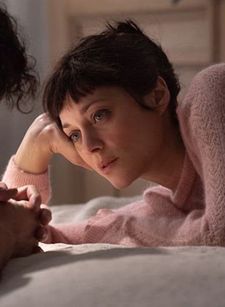 |
| Marion Cotillard in Frère Et Sœur (Brother And Sister) to première at Cannes |
He’s concerned with his own death, he’s concerned with what will happen with his books, with his ego, but when he’s in front of a woman, he’s listening to her. And is not asking her to be triumphal or tragic, it can be small events. I think about the Czechoslovakian girl who used to be a teacher and a translator and now she’s just a seller in a stupid shop in England.
AKT: She says the great line: “I have no place here, none at all.” I am educated, but here I’m just the “Czech girl.”
AD: I think that this line “I have no place here” is the line each woman could say in the film. Obviously Léa is not at a place with this husband, with a child that she doesn’t like that much, with this unhappy marriage, with a stupid job.
AKT: She has another good line “There is no dignity without income!”
AD: Which is so rude and cruel to say it.
AKT: But so true.
AD: Also I’m thinking about Emmanuelle Devos who is giving such a heartbreaking performance in the part of Rosalie Nichols. She’s in this hospital in New York, dying of cancer. She didn’t find her place on earth. It seems to me that the only utopia we can have is that the only one who finds his place on earth is Philip when he’s in his office writing.
At this moment he found the only minimal utopia that you can have. When you write, perhaps you can find a place on earth. And perhaps listening to others can help them in order to find their own voice. Even if it costs a certain price.
AKT: And not to despair. One line is quite heartbreaking, it got close to me. It’s a line Emmanuelle Devos says in the film: “A phone call from my father makes the cancer worthwhile.”
AD: Which is a terrible joke.
AKT: More than a terrible joke.
AD: I read the Janet Hobhouse book [The Furies] when I was writing the film. There is a portrait of Philip Roth, she was one of the lovers of Philip Roth. She had this cancer and she has very cruel and crude ways of speaking about her disease and the fact that she is dying and fighting and is sometimes in big despair and sometimes with big hope and sometimes with good jokes. She was so brave and I admire her as a writer and I think it’s a wonderful tribute that Philip Roth paid to Janet Hobhouse.
AKT: And Emmanuelle is just wonderful. All of them are terrific.
AD: Denis had a small part in My Sex Life and one thing for the Comédie Française, eight years ago, a small part too in a Russian play [La Forêt by Aleksandr Ostrovskiy]. Denis is well-known in France for being a wonderful writer. He wrote a few books about acting. The style, the prose of it is really remarkable. He’s an incredible reader. He’s read everything. He’s reading all the time, you know, in the staircase.
When he’s playing on stage, in the wings he’s reading. He puts down his book, goes on stage, says his lines, and when he’s back, he’s sitting on a chair, reading again. He’s such a book lover that he was perfect for the part. We had an issue when I was offering the part to Denis, he said “But I’m not Jewish.” I said “Okay, don’t worry, I’m not Jewish either, but I can take care of that part.”
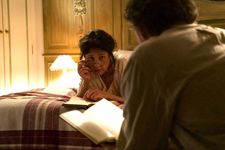 |
| Philip (Denis Podalydès) with his wife (Anouk Grinberg) |
AKT: It’s a big part and it’s shocking to read in the Roth novel at times how far he goes.
AD: Perhaps there’s one thing, which is not that close to Denis, which is closer to me, is the fact that Philip is never looking for forgiveness or whatever. He’s as is, he’s absolutely imperfect, selfish as I was saying.
AKT: Absolutely imperfect is a great way to put it.
AD: He’s not looking for forgiveness. He’s not looking for redemption. And I think he’s not Christian at all, but not at all! That’s what’s so funny with him.
AKT: Not Christian at all, not even his bookshelves, there’s just Heinrich Heine and Hannah Arendt. And a baseball on his desk.
Coming up - Arnaud Desplechin on costume designer Jürgen Doering and more on the wonderful cast of Deception.
Read what Arnaud Desplechin had to say on getting a phone call from Philip Roth.
Read what Arnaud Desplechin had to say on composer Grégoire Hetzel, cinematographer Yorick Le Saux, and Frère Et Sœur.
The Cannes Film Festival runs from May 17 through May 28.








